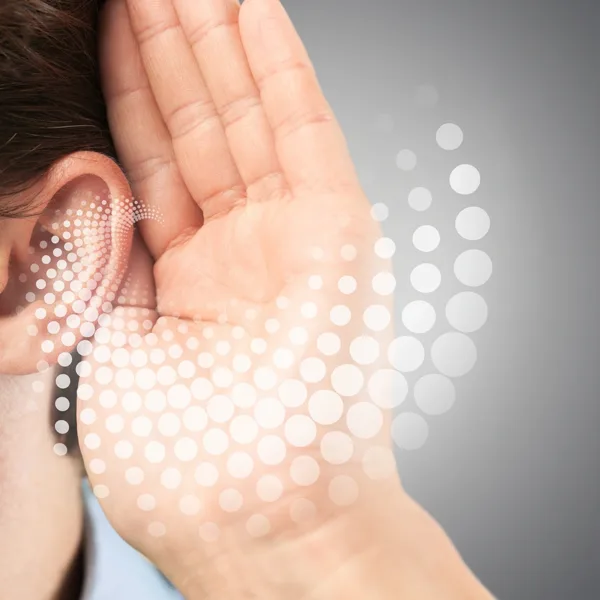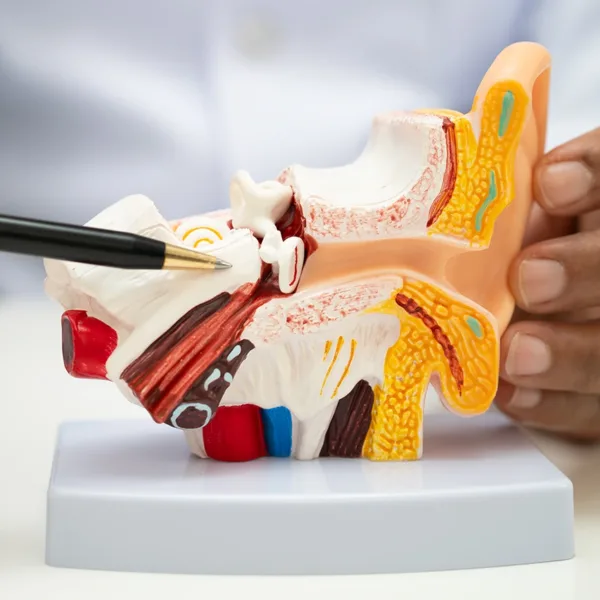
How to Encourage Someone to Wear Their Hearing Aids
More than 50 million people in the U.S. have some degree of hearing loss.1 However, surveys show that only 1 in 5 people who need hearing aids actually wear them.2
From simple forgetfulness to worrying about stigma, the reasons for avoiding wearing hearing aids are broad and complex. But consistent use is key to experiencing the full benefits, like clearer conversations, stronger connections with loved ones, and even greater independence.
In this article, we share practical strategies you can use to gently encourage someone to wear their hearing aids and make hearing health a natural part of everyday life.
Encouragement Starts with Empathy and Patience

Encouraging someone to wear their hearing aids starts with offering the right mix of support, understanding, and patience. The transition can feel overwhelming at first, and it’s normal for some people to feel hesitant or even resistant.
Patience is key here. Encouragement works best when it comes from a place of understanding and authentic care for their well-being. Your support can turn what might feel like a challenge right now, into a positive step toward a better quality of life.
Understanding the Reasons Behind Resistance
If you’re trying to encourage someone to wear their hearing aids more consistently, it’s important to understand why they might be hesitant in the first place. Resistance usually isn’t about stubbornness. Instead, it often comes from a mix of practical hurdles and emotional hang-ups that can make adjusting to a new wellness routine feel more like a burden than a benefit.
Below are some common reasons why a person might not wear their hearing aids every day and how you can help them:
Forgetfulness
It can be hard for some people to get into the habit of putting their hearing aids on every morning. Creating simple routines and providing gentle reminders can help make adjusting to this new routine easier.
Comfort and Fit Issues
New hearing aids can feel unusual or even uncomfortable at first. Some people are hyper-aware of the sensation of something in the ear, so even small, custom-fit devices can take time to get used to.
Working with their hearing care specialist to ensure the device fits properly and addressing discomfort early can make a big difference.
Stigma
Some people worry about hearing aids affecting how other people see them. They may fear that wearing them makes them look “old,” which can make them hesitant to wear their devices in social situations.
Reassurance, normalization, and gentle encouragement can help reduce these concerns.
Adjustment Period
When you start wearing hearing aids for the first time, the brain needs time to adapt to new sounds. This adjustment period is completely normal and a positive sign that the brain is relearning how to process sounds again.
But adjusting to hearing aids is a gradual process that varies from person to person. Everyday sounds may seem louder, sharper, or unfamiliar at first, which can be overwhelming.
Their specialist can help with managing this adjustment period by optimizing the settings and easing them into their full hearing prescription.
No matter their reasoning, by identifying what’s really getting in the way, you can respond with support and help them find solutions for their concerns.
Share Success Stories
Sometimes the most impactful encouragement comes from learning from other people’s success stories. If your loved one is hesitant to wear their hearing aids, try sharing testimonials from other people who have had positive experiences using them.
Hearing firsthand how others now enjoy clear conversations, stronger relationships, or a more active lifestyle can help ease fears and fuel motivation. Knowing they’re not alone and seeing how others have overcome similar obstacles might make the transition feel more achievable.
Involve Family and Friends in Supportive Ways

The support of family and friends can play a powerful role in encouraging daily hearing aid use. By creating a caring, inclusive environment, you can help your loved one feel motivated to use their hearing aids consistently, without feeling pressured or self-conscious. Even simple gestures of support can make a big difference.
For instance, when talking to someone who is still getting used to hearing aids, make an effort to speak clearly and face them during conversations. This can help them focus on the sound of your voice and process speech better. Giving them extra time to respond and not rushing to repeat yourself if they haven’t asked you to, can also be helpful.
Encouraging your friends and family to do this too, can help your loved one feel more comfortable wearing their hearing aids around other people.
Focus on the Benefits of Wearing Hearing Aids
Sometimes, the best way to encourage someone to wear their hearing aids is to remind them of the positive changes they’ll experience. By helping them understand how hearing aids can improve their daily quality of life, you can help them feel empowered and motivated.
Below are just a few of the incredible lifestyle and wellness benefits hearing aids have to offer:
Reduced Risk of Dementia
Research shows that untreated hearing loss can increase the risk of dementia in older adults.3 Even just mild degrees of hearing loss can double the risk, with moderate to severe hearing loss increasing the risk 3 to 5 times, respectively.3
The good news is that studies have also concluded that consistent hearing aid use can slow cognitive decline by up to 50%.4
Framing it as a way to keep their brain active and engaged can help them see hearing aids as more than just a communication device, but also as a tool for combating cognitive decline.
Greater Independence and Confidence
Wearing hearing aids can make everyday activities easier and more enjoyable. Doing things like talking on the phone, having conversations in noisy places, or participating in group activities can be effortless again.
Emphasizing how this can give them more independence and confidence in social settings may help them feel motivated to wear their hearing aids consistently.
Reduced Risk of Falls
Research shows a strong link between untreated hearing loss and an increased risk of falls.5 In fact, even mild degrees of hearing loss can more than double the risk of falling for older adults.5
However, wearing hearing aids consistently can reduce the risk of falls by 50% for individuals with hearing loss.6 Some hearing aids even have built-in fall detection features that automatically alert emergency contacts in the event of a fall.
Explaining these benefits can offer your loved one peace of mind and encouragement to wear their hearing aids every day.
Easier Engagement in Social Settings
One of the most powerful changes that hearing aids can bring is a renewed sense of connection. Many people with hearing loss avoid social gatherings because they struggle to follow conversations and feel included.
Hearing aids can make it easier to actively engage in discussions, laugh, and participate fully, helping your loved one feel more connected to friends and family.
When to Seek Professional Help
Even with patience, encouragement, and support, professional guidance will always play an essential role in ensuring your loved one gets the most from their hearing aids. Their hearing care specialist can provide adjustments, troubleshooting, and personalized advice to make wearing hearing aids easier and more effective.
It’s also important to watch for signs that indicate your loved one may need extra support. Persistent discomfort or difficulty hearing even with the aids in, or frustration that interferes with daily life, are all cues that it’s time to contact their specialist.
By involving a professional early on, you can help ensure they are getting the support and personalized care they deserve. Attending these appointments with them is also a great way to gain more insight into how to support them long-term.
Find More Resources and Support at an Audibel Clinic Near You
If you or someone you know is having trouble adjusting to hearing aids, you’re not alone. The hearing care specialists at Audibel are here to help you get the most from your treatment. All Audibel clinics offer new hearing aid wearer assistance for any brand of device, no matter where you got them.
Ready to take the next step? Find an Audibel clinic near you to get the hearing care you deserve.
References
- Quick statistics about hearing, balance, & dizziness. (2024, September 20). NIDCD. https://www.nidcd.nih.gov/health/statistics/quick-statistics-hearing
- McCormack, A., & Fortnum, H. (2013). Why do people fitted with hearing aids not wear them? International Journal of Audiology, 52(5), 360–368. https://doi.org/10.3109/14992027.2013.769066
- The hidden risks of hearing loss. (2024, August 1). Johns Hopkins Medicine. https://www.hopkinsmedicine.org/health/wellness-and-prevention/the-hidden-risks-of-hearing-loss
- Hearing aids slow cognitive decline in people at high risk. (2025, June 3). National Institutes of Health (NIH). https://www.nih.gov/news-events/nih-research-matters/hearing-aids-slow-cognitive-decline-people-high-risk
- Lin, F. R., & Ferrucci, L. (2012). Hearing loss and falls among older adults in the United States. Archives of Internal Medicine, 172(4), 369. https://doi.org/10.1001/archinternmed.2011.728
- Campos, L., Prochazka, A., Anderson, M., Kaizer, A., Foster, C., & Hullar, T. (2023). Consistent hearing aid use is associated with lower fall prevalence and risk in older adults with hearing loss. Journal of the American Geriatrics Society, 71(10), 3163–3171. https://doi.org/10.1111/jgs.18461







Have a question or Comment?